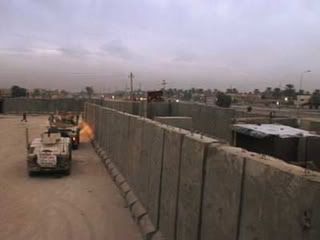
And, responding to the comments the Blackwater apologist made at this link:
Most contractors are locals and thus the costs are far, far cheaper than using Americans. Companies will always use locals if they have a choice, that's how they compete to win the contracts. Using locals contributes to the economy, to stability, to undermining the insurgents etc.. Two-thirds of our contractors in Iraq are Iraqis, the folks who should be doing their own security and reconstruction.the local Iraqi economy is not being helped:
With unemployment as high as 67 percent, the imported products and foreign workers flooding across the borders have become a source of tremendous resentment in Iraq and yet another open tap fueling the insurgency. And Iraqis don't have to look far for reminders of this injustice; it's on display in the most ubiquitous symbol of the occupation: the blast wall. The ten-foot-high slabs of reinforced concrete are everywhere in Iraq, separating the protected—the people in upscale hotels, luxury homes, military bases, and, of course, the Green Zone—from the unprotected and exposed. If that wasn't injury enough, all the blast walls are imported, from Kurdistan, Turkey, or even farther afield, this despite the fact that Iraq was once a major manufacturer of cement, and could easily be again. There are seventeen state-owned cement factories across the country, but most are idle or working at only half capacity. According to the Ministry of Industry, not one of these factories has received a single contract to help with the reconstruction, even though they could produce the walls and meet other needs for cement at a greatly reduced cost. The CPA pays up to $1,000 per imported blast wall; local manufacturers say they could make them for $100. Minister Tofiq says there is a simple reason why the Americans refuse to help get Iraq's cement factories running again: among those making the decisions, “no one believes in the public sector.”(link via dirk gently)
No comments:
Post a Comment